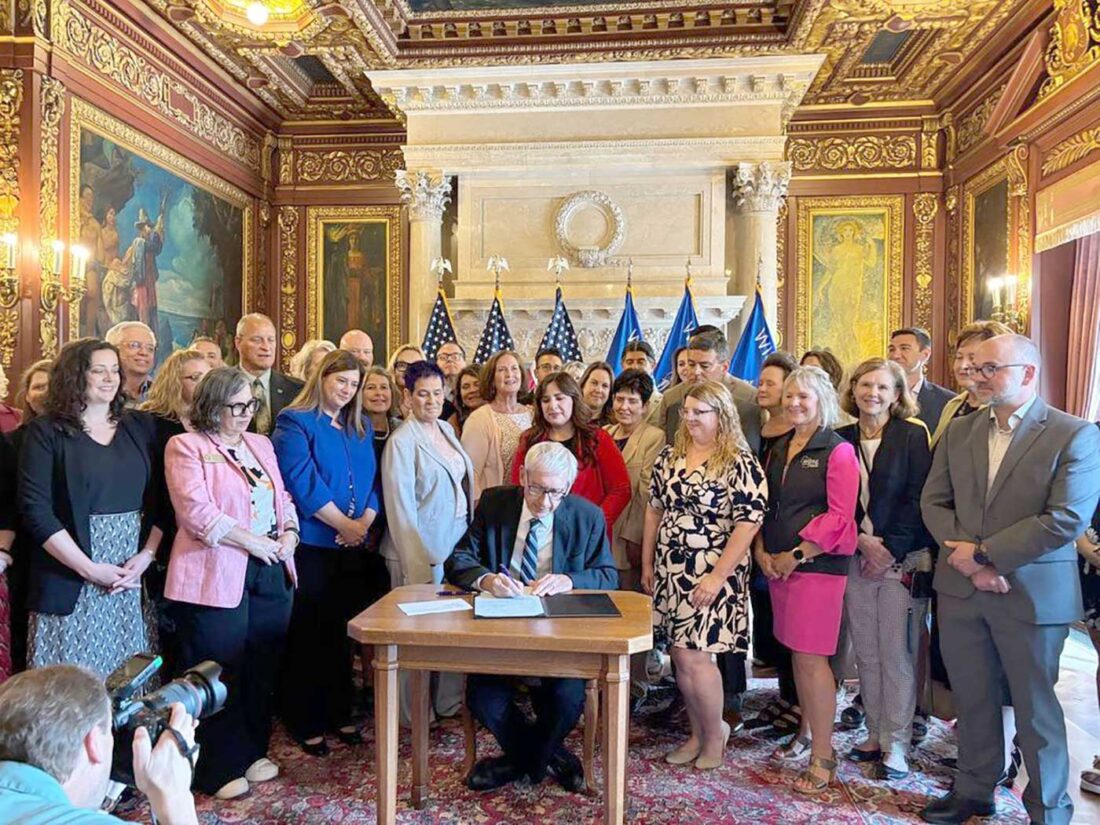Evers signs bill letting nurses with advanced credentials practice independently

Gov. Tony Evers signs AB 257 into law Friday. The bill creates a credential and pathway for advanced practice registered nurses to practice independently. (Photo courtesy of Office of Gov. Evers)
As expected, Gov. Tony Evers signed legislation Friday that clears the way for nurses with advanced training to practice independently.
“Nurses play a critical role in our healthcare workforce, and I’m proud of our work to expand opportunities for nurses to not only grow their career but create a system that allows for more advanced practitioners here in Wisconsin,” Evers said in a statement released Friday announcing his plans to sign AB 257, the advanced practice registered nurses (APRN) legislation, now Wisconsin Act 17.
The bill creates a new license category and a professional pathway for nurses who qualify to practice independently.
Evers vetoed two other closely watched bills — one that would have carved out app-based drivers from protections under state employment laws and one that would require the state Department of Corrections to recommend sending back to prison people charged with a crime while they are on probation, parole or extended supervision.
Altogether the governor signed 16 of the 21 bills that the Legislature formally presented to him on Thursday and vetoed five.
Advanced practice nursing bill wins approval
The Wisconsin state nursing board will oversee the credentialing of advanced practice nurses, a group that includes certified nurse-midwives, certified registered nurse anesthetists, clinical nurse specialists and nurse practitioners.
Advocates said the measure will increase the availability of health care providers, particularly in parts of Wisconsin where doctors are scarce.
Evers vetoed previous versions of the bill in 2022 and 2024. Both times he expressed support for the concept but insisted nurses should meet tighter qualifications before they can practice on their own.
The bill he signed Friday adds those requirements — increasing the amount of supervision that an APRN must have under a physician to 3,840 hours before practicing independently; adding additional supervision requirements for certified registered nurse anesthetists who specialize in pain management; and including language to restrict the titles APRN practitioners use so patients aren’t confused about their credentials.
The Wisconsin Medical Society cited those issues in opposing APRN bills in previous legislative sessions, and with the 2025 revision shifted its stance to neutral.
In floor votes in June, lawmakers from both parties stressed the bipartisan compromise reflected in the measure that was presented to Evers this week.
In his announcement, Evers thanked lawmakers for their work on the measure, including Republican state Sens. Patrick Testin and Rachael Cabral-Guevara, Republican state Rep. Tony Kurtz and Democratic state Rep. Lisa Subeck.
He also thanked “the many nursing and physician groups that we worked with to get this bipartisan bill across the finish line to help bring more folks into the healthcare profession and ensure that Wisconsinites get the high-quality care they need when they need it while setting our nurses up for success.”
Bill classifying gig drivers vetoed
Evers vetoed AB 269, legislation that would have blocked drivers from app-based rideshare and delivery businesses from being declared employees.
The legislation would have automatically classified drivers for Uber, Lyft, DoorDash and similar businesses as independent contractors, bypassing current Wisconsin laws that differentiate independent contractors from direct employees.
It would have categorically excluded app-based drivers from coverage under the state’s unemployment insurance, workers compensation and minimum wage laws.
“I object to the bill’s definition of independent contractor status in the absence of any guaranteed benefit for workers,” Evers wrote in his veto message.
In a campaign pushed most prominently by DoorDash and other app-based businesses that enlist drivers, advocates focused on the bill’s provisions that would permit — but not require — those businesses to establish portable benefits for drivers.
Evers acknowledged in his veto message that app-based drivers “are a growing segment of Wisconsin’s workforce.” But he said changing the state’s independent contractor definitions “demands substantive conversations among several parties,” with management and workers both at the table.
Evers wrote that while the bill was moving through the Legislature, his staff asked lawmakers and groups with an interest in the measure to allow time for “robust dialogue and engagement to reach consensus and compromise” over the legislation.
“Unfortunately the Legislature declined to meaningfully provide that opportunity, choosing instead to send this bill to my desk anyway,” he wrote. “My veto today will allow time for these important conversations to occur so Wisconsin can find a path forward.”
The Wisconsin AFL-CIO praised the veto. “Legislation that makes the loss of important worker rights a certainty while holding out the possibility of flexible benefits if and when the employer chooses to provide them is a bad deal for workers,” President Stephanie Bloomingdale said.
Bill pushing revocation for offenders rejected
Evers vetoed AB 85, legislation that would require the Department of Corrections to recommend automatically returning a person to prison who is charged with a crime while on extended supervision, parole or probation. Evers vetoed a similar bill in 2019.
Evers wrote in his veto message that the legislation was “an unfunded mandate” likely to cost the state more than $330 million in the first two years, according to the fiscal estimate, “and hundreds of millions in unknown, ongoing costs.”
In addition, he wrote, it would likely require building more prison facilities and would be expected to impose new costs on local governments, while he blamed lawmakers for “significantly underfunding existing operations at the Department of Corrections in the most recent state budget.”
The bill “would move Wisconsin in the wrong direction on criminal justice reform without improving public safety,” Evers wrote.
Instead, he urged lawmakers, “Wisconsin should be investing in data-driven, evidence-based programming that addresses barriers to reentry, enhances educational and vocational opportunities for individuals who will be released after completing their sentence, and provides treatment for mental health and substance use issues, which will help to reduce recidivism and save taxpayer money while improving public safety.”
In a message posted on Facebook the bill’s author, state Rep. Brent Jacobson, R-Mosinee, criticized the veto. “It is unacceptable to give repeat criminals the opportunity to continue to put our families and neighbors at risk again and again without facing consequences,” he wrote.
The bill was opposed by criminal justice reform organizations, including the national prison reform group Dream.Org and Wisconsin-based Ex-incarcerated People Organizing, or EXPO.
“This harmful bill would have led to more people being revoked from community supervision and incarcerated, making it harder to build safe and thriving communities in Wisconsin,” Dream.Org posted on Facebook. The organization credited campaigning by advocates and community groups with persuading Evers to veto the measure.
Primary care medicine measure falls
Evers vetoed SB 4, legislation that would specify that subscription-based direct primary medical care arrangements are not subject to the state’s insurance laws.
While the legislation had some bipartisan support in concept, it foundered at the governor’s desk on the issue of anti-discrimination language.
Evers listed in his veto message a number of provisions in the legislation that forbid primary care providers from refusing to treat patients.
Nevertheless, he wrote that he objected to “the Legislature failing to provide sufficient protections for patients receiving care under direct primary care agreements from being discriminated against and potentially losing access to their healthcare.”
Evers did not specify what additional protections he believed the measure should include. “I previously raised similar concerns when I vetoed earlier iterations of this legislation five years ago — concerns the Legislature has declined to satisfactorily address in the bill that is now before me and despite having ample opportunity,” he wrote.
In 2020, when Evers vetoed the version of the legislation on his desk at the time, he wrote that he objected to an amendment in which lawmakers had removed language protecting patients from being refused treatment on the grounds of “genetics, national origin, gender identity, citizenship status, or whether the patient is LGBTQ.”
In his veto message Friday, Evers wrote, “Every Wisconsinite should be able to get the health care they need when and where they need it — and without fear of discrimination. I welcome the Legislature revisiting this legislation and the opportunity to enact a version of this bill that sufficiently addresses my concerns.”
The announcement issued by the governor’s office Friday includes a complete list of bills that the governor signed and vetoed, with links to the enacted measures and to Evers’ veto statements.
———
Wisconsin Examiner is part of States Newsroom, the nation’s largest state-focused nonprofit news organization. For more, go to https://wisconsinexaminer.com/.




